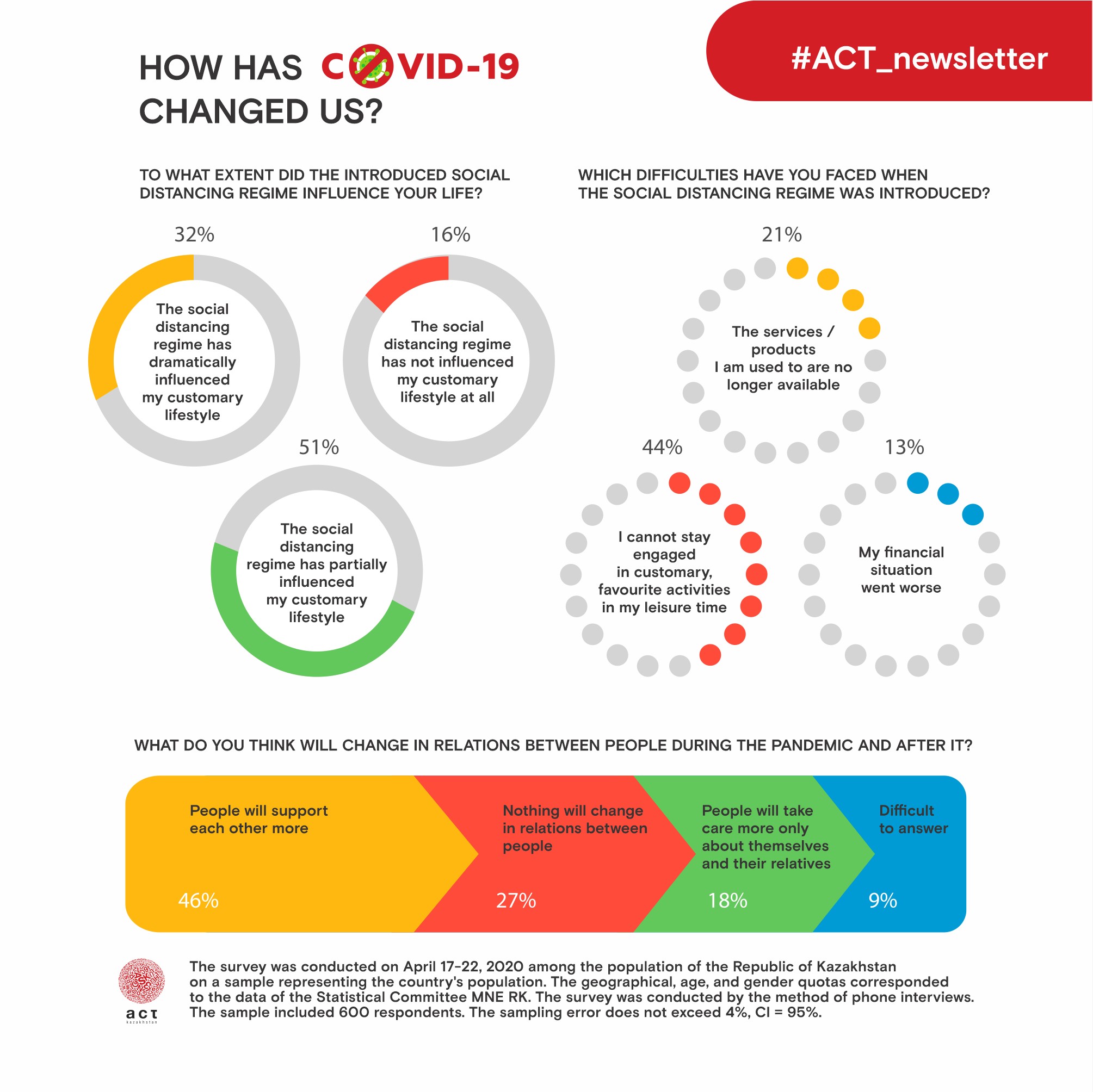ACT Kazakhstan continues a series of articles devoted to the study of the impact the emergency regime and the self-isolation regime have on Kazakhstanis. 51% of Kazakhstanis have noted that the introduced social distancing regime partly influenced their customary lifestyle. One-third of the respondents (32%) say that the social distancing regime has strongly influenced their customary lifestyle. 16% are not affected by the social distancing regime. The survey also aimed to study the behavioral patterns of Kazakhstanis in the settings of the COVID-19 pandemic.
In terms of the emotional perception of the quarantine-related situation, Kazakhstanis demonstrate a high level of adaptivity to the conditions (TOP5):
- I remain optimistic and spread hope – 25%
- I am aware of the current situation and think about how to act in the current situation and the future – 20%
- I realize that we are all trying to do our best in the current environment – 17%
- I am looking for a way to adapt to changes – 10%
- I am thinking about the others and how I can help them – 8%
In terms of difficulties/inconveniences that Kazakhstanis are facing with the introduction of social distancing regime, we got the following answers:
- For many Kazakhstanis, quarantine means the limitations in terms of accessibility of goods, services, the ability to manage your needs and desires
- For 44% of respondents, it means an inability to engage in familiar, favourite activities (like meeting friends, going to a cinema, going out of the city, etc.)
- For 21% of respondents, it means an inability to purchase certain familiar products or services, like: I cannot visit a beauty salon, gymnasium, do shopping, visit a doctor, etc.
- For 5% of respondents, it means an inability to travel, visit the pre-scheduled events.
- But for some Kazakhstanis quarantine was related to even more negative events
- For 13%, the financial situation went worse
- For 3%, the relations with the close ones went worse
- For 3%, isolation has a negative effect on mental state due to anxiety/oppression/depression
And, finally, we tried to use the survey to look into the future and learn what will happen after the pandemic, would the Kazakhstanis return to their usual life and what kind of relationship between people will develop. The results have instilled in us optimism and deep faith in our people. 46% of Kazakhstanis believe that people will become more supportive of each other; 27% think that nothing will change after the pandemic is over. Оnly 18% believe that people will take care more about themselves and their close ones, and 9% had no answer. Still, there is an interesting difference between age groups in how they see future relations between people. Younger people aged 18 to 24 years mostly believe that people will take care more only about themselves and their close ones. Half of the Kazakhstanis aged 25-34 years believe that nothing will change in the relations between people; another half thinks that people will support each other more. People aged 35 years and older expect that, after the COVID-19 pandemic, people will support each other more.
The survey was conducted on 17-22 April 2020 among the population of the Republic of Kazakhstan on a sample representing the country’s population. The geographical, age- and gender-related quotas corresponded to the data of the Statistical Committee MNE RK. The survey was conducted by the method of phone interviews. The sample included 600 respondents. The sampling error does not exceed 4%, CI = 95%.The use of survey materials is permitted with the obligatory mention of the author of the survey.






